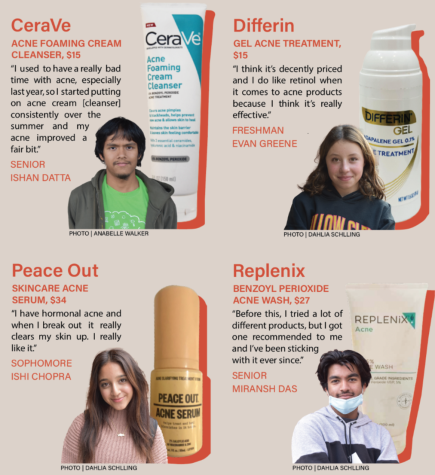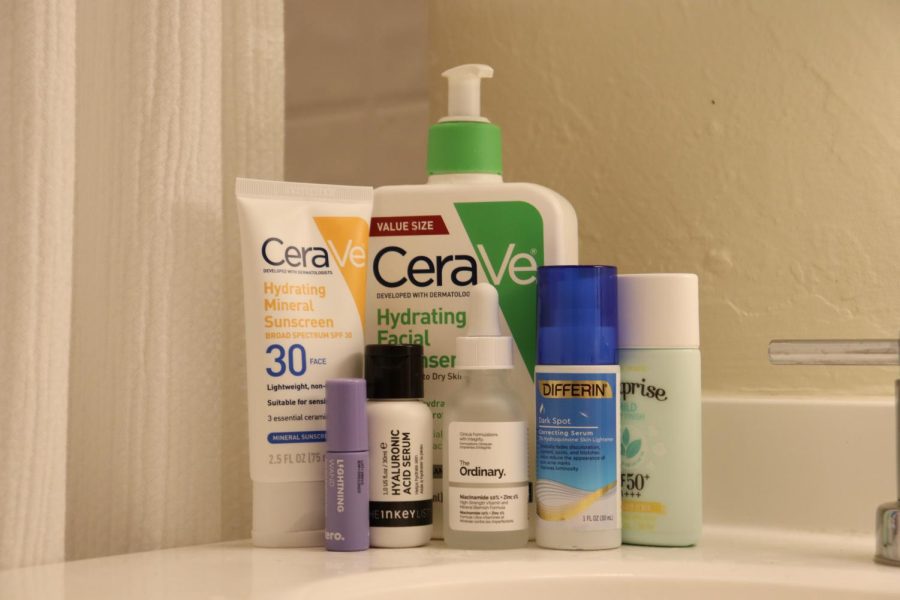Afterglow
Surveying the effects of skin care routines
November 17, 2022
If the teenage experience is known for something besides awkward first dates and obtaining driver’s licenses, it’s acne. In America, acne is one of the most common skin conditions, according to the American Academy of Dermatology. A poll of 162 MVHS students reveals that 56% of individuals have a skin care routine incorporated in their everyday life to prevent or mitigate acne.
Junior Jayden Lim consistently follows a skin care routine. Lim began his skin care regime in elementary school, which only consisted of washing his face with water and soap. Since then, it has evolved to include benzoyl peroxide cream, sunscreen and hyaluronic acid. When he was in the seventh grade, Lim visited a dermatologist to learn even more about how to take care of his skin, and has been regularly attending appointments since.
“People are always saying, ‘Oh, having acne or blemishes on your skin is very normal — you shouldn’t feel bad [about] it, but I do if I’m being honest,” Lim said. “Being more confident about my skin, having a skin care routine and actually seeing improvements has felt good, because I know it’s working.”
Dermatologist Jenny Murase M.D. confirms these sentiments, and says she has noticed a connection between skin care and confidence in her patients.
“I think that your face is a window to the world,” Murase said. “If you have a clear complexion, it makes a huge difference in terms of your confidence around other people.”
According to a survey of MVHS students 60% were originally introduced to skin care by family members. Freshman Alex Sharma, found skin care through their family and friends. Sharma finds skin care comforting, as it helps improve their self confidence. Although they didn’t use to have an issue, in recent years they’ve struggled with acne. Having a skin care routine allows them to feel more confident, as they feel the procedure is improving their skin.

According to Murase, it is important for everyone to create a stable and well sourced skin care routine, although she says that skin care for women is more heavily advertised than it is for men.
“I think that [the] industry targets women more in terms of products,” Murase said. “But acne affects both genders. It’s not uncommon. I would say the acne visits are about 50/50 [between genders]. It’s not like I see more women presenting with acne than men.”
According to a New York Times article, the skin care industry follows outmoded product marketing that mainly targets women or feminine-presenting people in comparison to men or masculine-presenting people.
Lim says that although he has noticed a stigma surrounding men practicing skin care in the past, he feels it has become more normalized recently.
“For guys, [skin care] can obviously be very looked down upon because of gender roles and stereotypes, but I feel I’ve seen a lot more guys getting into skin care,” Lim said. “I think people have realized that it’s important and it’s something that you should do on top of just taking care of your personal hygiene daily.”
A survey of 126 MVHS students shows that 72% believe there is a stigma around men or masculine-presenting people practicing skin care, indicating how practicing skin care can still be looked down upon. But Sharma disagrees with this mindset, stating the importance of skin care being practiced by everyone.
“It’s like showering. It’s important,” Sharma said. “I don’t get why people think it’s just a female thing. It’s for everyone. It doesn’t matter.”


















